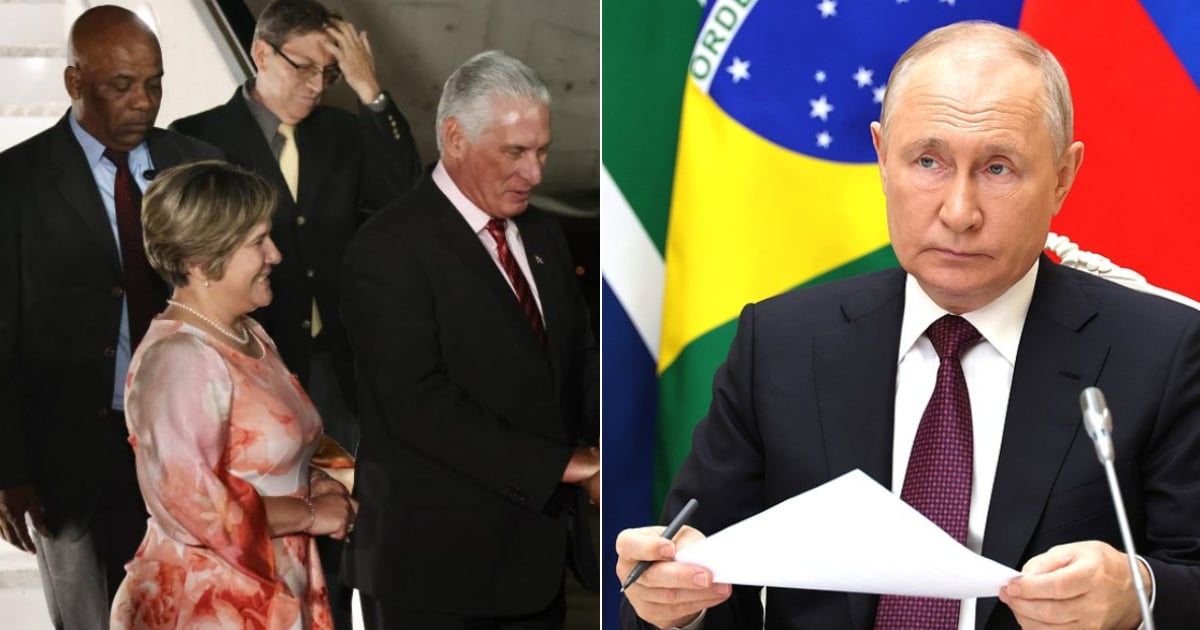
The Cuban regime formally requested its admission as a "partner country" to the BRICS group, an international organization originally composed of Brazil, Russia, India, China, and South Africa, which has recently added new members.
This action was confirmed by the director general of Bilateral Affairs of the Ministry of Foreign Affairs of Cuba, Carlos Miguel Pereira, through his account on the social network X.
Pereira explained that the request was made through a letter addressed to the Russian leader, Vladimir Putin, who holds the presidency of BRICS this year.
According to the official, Cuba's adherence to this forum represents an opportunity to strengthen its position in global geopolitics and to join what it considers a key group for the interests of Global South countries. In his message, he highlighted the potential of BRICS to provide an economic and political alternative to blocks dominated by Western powers.
Cuba's interest in BRICS is not surprising, as the regime has been seeking international allies for some time to keep afloat an economy that is struggling on all fronts, a condition that would allow the regime to remain in power, the true motivation of the dictatorial leadership.
The approach to the BRICS is also part of a series of recent diplomatic actions aimed at consolidating the relationships of the totalitarian regime in Havana with emerging powers such as Russia, China, and India.
The support of Russia and China
During his recent visit to Russia, Cuba's Minister of Foreign Affairs, Bruno Rodríguez Parrilla, participated in a meeting of BRICS foreign ministers in the city of Nizhni Novgorod.
In that meeting, Rodríguez reiterated "Cuba's desire to integrate into the group," highlighting the "excellent relations" it maintains with Russia. Additionally, he emphasized the need for the BRICS to play a more active role in reforming the international financial system, one of the fundamental objectives of the Cuban regime to try to improve its economic situation.
Rodríguez took the opportunity to defend the creation of financial mechanisms within the BRICS that favor trade and investments among its members, with particular emphasis on cooperation in areas such as agriculture, renewable energies, and food production, key sectors to mitigate the global food crisis.
The chancellor also highlighted the role of the New Development Bank of the BRICS, which, according to him, would allow Cuba to access financing under more favorable conditions than those it could obtain from Western-dominated financial institutions, such as the International Monetary Fund (IMF) or the World Bank.
Before his stop in Russia, Rodríguez had visited China, where Xi Jinping's government reaffirmed its support for the Cuban regime. In this context, both countries committed to intensifying economic cooperation and seeking new ways to help the island face its deep internal crisis.
BRICS as a "lifeline" for the Cuban regime
After the initial push and the expectations generated, the BRICS bloc has been losing momentum as the “imperial ambitions” and “power” aspirations of the countries that make it up have come into conflict, generating distrust and suspicion among the members.
Burdened by the weight of the rhetoric typical of multinational forums, where objectives, principles, and action plans amount to mere expressions of "good intentions," the BRICS have seen their timid attempts to create a more inclusive and less dollar-dependent financial system fail.
The Russian invasion of Ukraine, the geopolitical tensions arising from the confrontation between China and the United States on the commercial and espionage front, and the lack of flexibility of its members, almost all countries with authoritarian governments or opposed to the liberal order, have slowed down the integration process into a bloc that has recently included countries like Egypt, Iran, and Saudi Arabia.
For the Cuban regime, the possibility of entering this bloc represents a hope of alleviating its economic and political situation, at a time when it is facing one of the worst moments in its recent history.
Although it has not yet been confirmed whether their application will be accepted (Syria has also requested admission), the Cuban regime appears determined to continue seeking alternatives to place its agenda in new geopolitical spaces. An agenda that is over 60 years old and that consists, basically, of perpetuating itself in power.
At a time of great instability in the international scene, with open wars involving countries with significant influence over the Cuban regime, such as Russia and China (which is waging its own trade and espionage battle against the United States), Cuba's integration into the BRICS raises questions about the regime's ability to defend its sovereignty and not yield to territorial concessions or compromising activities induced by “friendly powers.”
What do you think?
COMMENTFiled under: